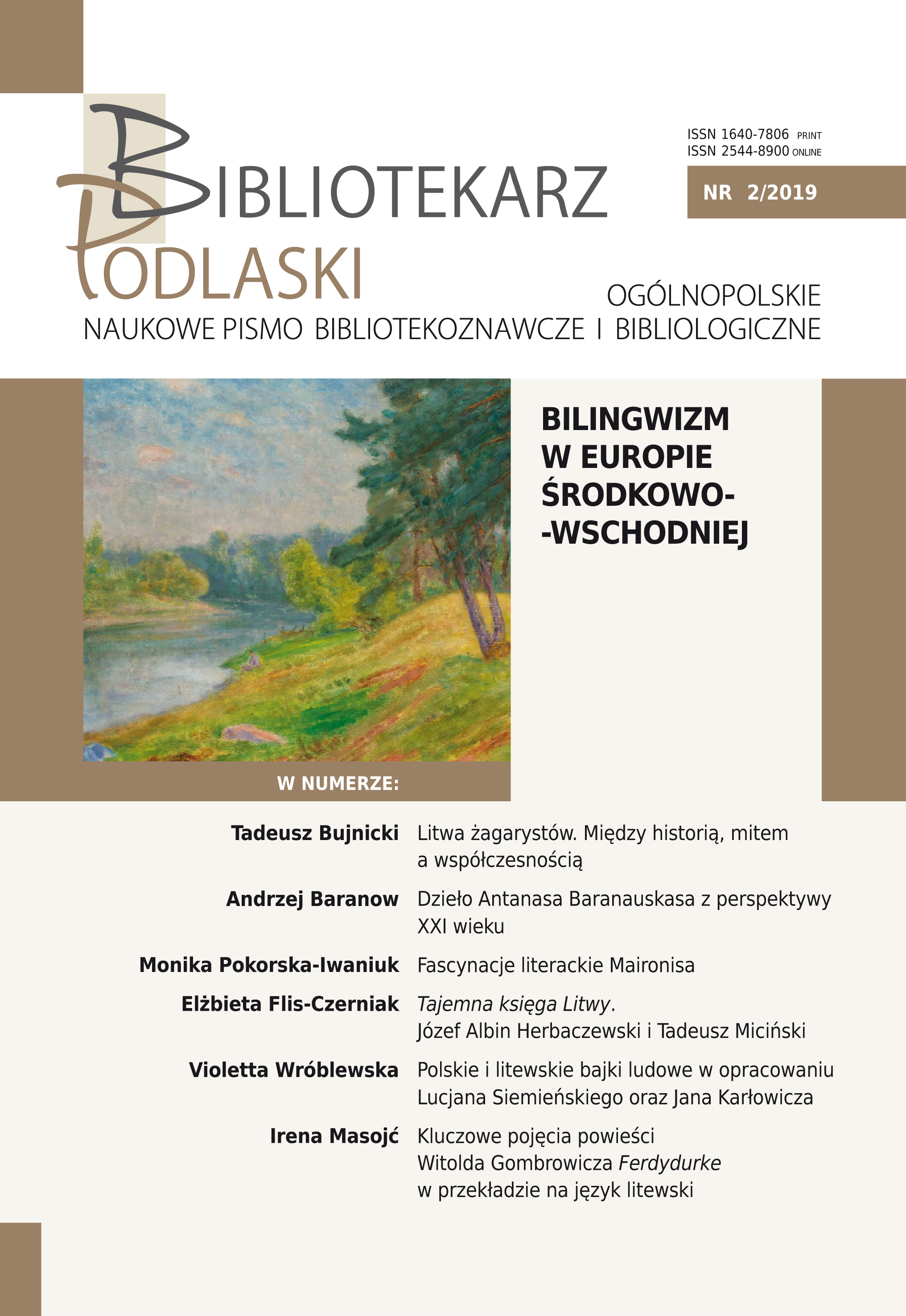Abstract
The figure of shelter sites – fundamental for Mickiewicz’s imagination – scrolls throughout all poet’s output and takes different shapes – from the traditional houses as buildings , real habitats up to unconventional houses such as the methaphoric “house of my spirit” from Rozmowa wieczorna or the house – nest set in the leaf (leaves) mentioned in the Lozanna piece titled Uciec z duszą. In Mickiewicz’s life there are the special “moments” of Lithuania’s eidos recognition that generate its oneiric lyric phantasms. There belong: the situation of exile and emigration, the perspective of distance or the feelings of longing and loss constitute in the poet’s imagination the pattern, the ideal of multilevel universe creating Konrad Wallenrod and Pan Tadeusz, permeated with the pictures of lost Eden. In both works the shelter sites, that arise from the affirming memory, are called explicitly Lithuania and embrace every cirle of the homestead – from home and its environment, through Homeland to the heavenly home of God Father – Paradise. In both these works there is the full picture of center – lost in Konrad Wallenrod and regained in Pan Tadeusz. Lithuania is the sacred place, the ideal existence, godly and heavenly, emerging from the past.The symbolic figure of Paradise represented by the nature of Lithuania is set here in two different dimensions of the world – the youthful Wallenrod, which is tragical, and eidetic Pan Tadeusz. The sketch presented above is an attempt to explain the Mickiewicz’s shelter sites – the image of Lithuania – Paradise that leads to Soplicowo.
References
Bachelard, Gaston. Wyobraźnia poetycka: wybór pism. Zredagowane przez Jan Błoński. Przetłumaczone przez Henryk Chudak i Anna Tatarkiewicz. Warszawa: Państ. Instytut Wydawniczy, 1975.
Bachórz, Józef, i Bolesław Oleksowicz, red. Mickiewicz w Gdańsku: rok 2005. Materiały międzynarodowej konferencji naukowej na 150-lecie śmierci poety. Gdańsk: Fundacja Rozwoju Uniwersytetu Gdańskiego, 2006.
Burzka-Janik, Małgorzata. W poszukiwaniu centrum: dom i bezdomność w życiu i twórczości Adama Mickiewicza. Opole: Wydawnictwo Uniwersytetu Opolskiego, 2009.
Delumeau, Jean. Historia raju: ogród rozkoszy. Przetłumaczone przez Eligia Bąkowska. Warszawa: Państwowy Instytut Wydawniczy, 1996.
Evdokimov, Paul. Kobieta i zbawienie świata. Przetłumaczone przez Elżbieta Wolicka-Wolszleger. Poznań: W drodze, 1991.
Głowiński, Michał, i Aleksandra Okopień-Sławińska, red. Przestrzeń i literatura: tom poświęcony VIII kongresowi slawistów. Studia. Wrocław: Zakład Narodowy im. Ossolińskich, 1978.
Jankowicz, Grzegorz. „Dalekie okolice: przestrzeń w «Konradzie Wallenrodzie»”. Ruch Literacki, nr 1 (2000): 31–53.
Kleiner, Juliusz. Mickiewicz. T. 1: Dzieje Gustawa. Lublin: Towarzystwo Naukowe KUL, 1948.
Kłosiewicz, Stefan. Ptaki święte, przeklęte i inne. Warszawa: Prószyński i S-ka, 1998.
Kobielus, Stanisław. Człowiek i ogród rajski w kulturze religijnej średniowiecza. Warszawa: Instytut Wydawniczy Pax, 1997.
Kowalski, Piotr. Leksykon - znaki świata: omen, przesąd, znaczenie. Warszawa-Wrocław: Wydawnictwa Naukowe PWN, 1998.
Krukowska, Halina. „Czarny romantyzm Goszczyńskiego”. Zamek Kaniowski, 2002.
Krukowska, Halina. „Pan Tadeusz” jako poezja czysta: studia i szkice o Mickiewiczu. Białystok: Wydawnictwo Prymat, 2016.
Ławski, Jarosław. Marie romantyków: metafizyczne wizje kobiecości: Mickiewicz - Malczewski - Krasiński. Białystok: IFP UwB, 2003.
Ławski, Jarosław. Mickiewicz - mit - historia: studia. Białystok: Trans Humana, 2010.
Mickiewicz, Adam. Dzieła. Wydanie Rocznicowe. Zredagowane przez Zbigniew Jerzy Nowak. T. 4: Pan Tadeusz. Warszawa: Czytelnik, 1998.
Mickiewicz, Adam. Liryki lozańskie Adama Mickiewicza. Strona Lemanu. Antologia. Zredagowane przez Marian Stala. Kraków: TAiWPN Universitas, 1998.
Plessner, Helmuth. Pytanie o conditio humana: wybór pism. Zredagowane przez Małgorzata Łukasiewicz. Przetłumaczone przez Zdzisław Krasnodębski i Andrzej Załuska. Warszawa: Państ. Instytut Wydawniczy, 1988.
Rymkiewicz, Jarosław Marek. Myśli różne o ogrodach: dzieje jednego toposu. Warszawa: Czytelnik, 1968.
Safranski, Rüdiger. Zło: dramat wolności. Przetłumaczone przez Ireneusz Kania. Nowy Sympozjon. Warszawa: Czytelnik, 1999.
Tuan, Yi-Fu. Przestrzeń i miejsce. Zredagowane przez Krzysztof Wojciechowski. Przetłumaczone przez Agnieszka Morawińska. Warszawa: PIW, 1987.
Articles published in the “gold open access” mode on the basis of a non-exclusive license agreement between the publisher and the author. Permitted use:
- the publication may be read and stored on any device,
- the publication may be cited (with obligatory reference to the author, the title of the text, as well as the full title, bibliographic address of the issue and page of the journal)
The editorial team of “Bibliotekarz Podlaski” implements an open access policy by publishing materials in the form of the so-called Gold Open Access. From volume 42 (issue 1/2019), the journal is available under the Creative Commons license (Attribution – ShareAlike: CC BY-SA).
The key declarations of the Open Access and Open Science movement, which we fully support, are available on the CEON Open Science website.
COPYRIGHT:
The editorial team of “Bibliotekarz Podlaski” implements an open access policy by publishing materials in the form of the so-called Gold Open Access. The journal is available under the Creative Commons license – Attribution – ShareAlike 4.0: International: CC BY-SA 4.0).
The key declarations of the Open Access and Open Science movement, which we fully support, are available on the CEON Open Science website.
“Bibliotekarz Podlaski” allows its readers to read, download, copy, distribute, print, search and link to the full content of articles. We enable full, immediate, unlimited (both in a territorial, temporal and technical sense) open access to all published content, in accordance with the principle that freely available research increases and accelerates the global development of science and the exchange of knowledge.
The editorial team of “Bibliotekarz Podlaski” encourages authors to place articles published in the journal in open repositories (after the review or the final version of the publisher), provided that a link to the journal’s website is provided.
The journal does not charge the authors any fees for accepting and publishing their texts.


